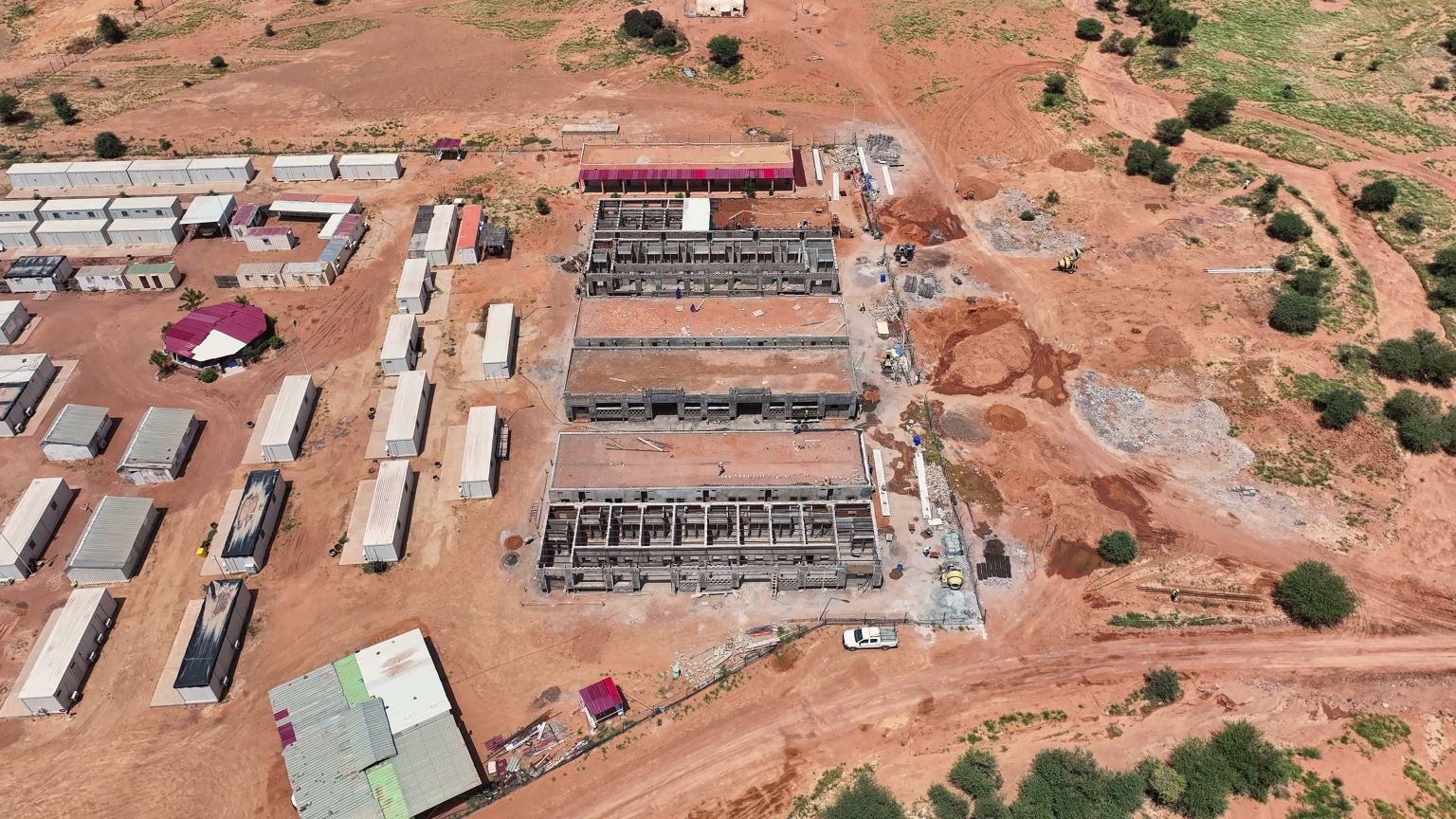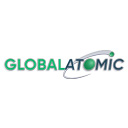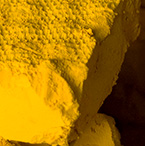Global Atomic Releases Results on a Year of Bridging Uranium Development & Zinc Production

Global Atomic reports progress on Dasa uranium project while exploring multiple financing options, adjusting production timeline to H1 2026 amid strong Niger support.
- Global Atomic is actively pursuing multiple financing options for its Dasa Uranium Project, including a potential US Development Bank loan for 60% of costs, joint venture partnerships, and offtake financing structures.
- The company has adjusted its production timeline from Q1 2026 to H1 2026, contingent on securing financing, but mine development has reached the ore zone with underground infrastructure progressing on schedule.
- The company's 2024 Feasibility Study increased mineral reserves by 50% to 73 million pounds U3O8, extending mine life from 12 to 23 years with an NPV8 of US$917 million at $75/lb uranium.
- The Niger government continues to provide strong support for the Dasa Project, with high-level endorsements from key officials and formation of a dedicated government committee to streamline operational matters.
- The Turkish Zinc Joint Venture returned to profitability in 2024 with revenues of $44 million (up from $30 million in 2023), supported by higher zinc prices and lower input costs.
Global Atomic Corporation (TSX: GLO) is a publicly traded company that provides a unique combination of high-grade uranium mine development and cash-flowing zinc concentrate production. The company's primary focus is developing the fully permitted Dasa Uranium Project in Niger, and holds a 49% interest in Befesa Silvermet Turkey, S.L., which operates a modern zinc recycling plant in Iskenderun, Turkey, recovering zinc from Electric Arc Furnace Dust (EAFD) to produce high-grade zinc oxide concentrate for global zinc smelters.
Capital Costs & Project Timeline
According to the company's 2024 Feasibility Study, capital costs for the Dasa Project, before working capital, corporate, and financing costs, were estimated at US$375.6 million. Despite higher logistics costs and related delays, current estimates show only a 4.6% increase to US$392.8 million.
The company had incurred US$124.7 million in capital costs by the end of 2024, leaving US$268.1 million to fund. Global Atomic has continued funding the project since year-end, further reducing remaining capital requirements. Either the debt financing or JV alternative currently under discussion is expected to cover the remaining project costs.
Due to the financing timeline, Global Atomic has adjusted its production start date from Q1 2026 to H1 2026, with management emphasizing that once financing is secured, they will implement strategies to accelerate development.
Financial Position
Global Atomic completed several successful financings in 2024 to support its development activities. These included the exercise of warrants in February 2024 for proceeds of $9 million, a unit private placement in July 2024 raising gross proceeds of $20.0 million, and a unit public offering in October 2024 raising gross proceeds of $40.25 million.
More recently, in January 2025, the company closed a unit private placement for gross proceeds of $35.6 million. The company's cash balance as of December 31, 2024, was $18.7 million.
Financing Dasa Development
Global Atomic is currently navigating several financing pathways for its flagship Dasa Uranium Project. The company is engaged with a US Development Bank to establish a debt facility to finance 60% of the project's development costs. Following a pause around the 2024 US presidential election, the bank has re-engaged with Global Atomic, with senior management confirming their interest in supporting the project.
"Until a financing commitment is signed, the company will manage its spending in the near term. By managing the current cash position, we will have additional time to finalize terms with an option best suited to the company and its shareholders, without coming back to the equity market in the near term," commented Stephen G. Roman, Global Atomic President and CEO, in the news release.
The company expects the bank's credit committee to review the loan application by the end of April 2025, noting that the Dasa Project aligns with US Administration foreign policy and investment goals. While pursuing this option, Global Atomic is simultaneously exploring a potential joint venture partnership as an alternative financing route, which would involve selling a minority interest in the project.
Mining Progress & Infrastructure Development
Underground development at Dasa, which began in November 2022, has now reached the ore zone with development waste being transported to the surface. The company reports waste development tonnage including 967 tonnes of medium-grade material (3,000 to 5,000 ppm), 11,378 tonnes of low-grade material (1,300 to 3,000 ppm), and 18,050 tonnes of mineralized waste (240 to 1,300 ppm).
Recent progress includes completion of underground ramp paving to ensure durability for mining team access and ore delivery. Ramping and underground level development continues to facilitate stope access on five levels in preparation for processing plant commissioning. The company has also completed Fresh Air Raise and Return Air Raise systems with fans installed to provide greater ventilation as mine development extends.
The Dasa Mine, operated by SOMIDA and overseen by Global Atomic, had achieved 960 days with no Lost Time Injury (LTI), highlighting the company's commitment to operational safety.
Processing Plant Construction Advances
On the processing front, procurement of long-lead equipment is complete, with manufacturing finished and components delivered to the Dasa site. The company's Engineering, Procurement, and Contract Management (EPCM) contractors are nearing completion of final detailed engineering and ordering the remaining components for the processing plant.
Earthworks for site preparation continued through 2024, with the acid plant foundation area completed and handed over to civil works contractors. Construction of an additional 260-person housing facility is also nearing completion, addressing the infrastructure needs for employees and construction crews.
Feasibility Study Highlights Strong Economics
In March 2024, Global Atomic announced results from an updated feasibility study that substantially improved the project's economic profile. The study increased mineral reserves by 50% to 73 million pounds U3O8 and boosted uranium production by 55% to 68.1 million pounds U3O8 while extending the mine life from 12 to 23 years.
Using an average uranium price of $75/lb U3O8, the feasibility study shows an NPV8 of US$917 million, an Internal Rate of Return of 57%, and a payback period of just 2.2 years. These metrics reinforce the project's robust economics even in a volatile uranium price environment.
Uranium Market Conditions & Offtake Agreements
Throughout 2024, spot uranium prices experienced significant volatility, trading between $120/pound U3O8 and $65/pound U3O8, while long-term contract prices increased to and remained steady at $80 per pound U3O8 by year-end. The company notes that the fundamentals affecting spot and long-term prices differ, with the spot market influenced by utilities assessing US tariff implications, financial players stepping out temporarily, and traders manipulating prices on small volumes.
Global Atomic has successfully secured four offtake agreements, including one finalized in December 2024 with a European nuclear power utility for 260,000 pounds U3O8 each year for three years. The company has currently contracted 43% of projected uranium production through the first five years of operations, representing 11.5% of the 68.1 million pounds of U3O8 production in Dasa's current 23-year mine plan.
Niger Government Support
Despite political changes in Niger, government support for the Dasa Project remains strong. During a May 2024 site visit, Mines Minister Commissaire Colonel Ousmane Abarchi stated: "We came here, we visited the mine, and we launched the earth breaking operations for the mill construction. Dasa is a reality everyone can see. We thank you all. We are supportive of the SOMIDA team and Global Atomic. This project is very important for us as a Government and as a shareholder. We want Dasa to be the start of a new Niger mining practice with expectations on State Income, Employment and Environment management."
Further reinforcing this support, in August 2024, Global Atomic received a letter from Niger's Head of State, His Excellency Brigadier General Abdourahamani Tiani, instructing his Cabinet, the Minister of Mines, and all stakeholders to facilitate the implementation of the Dasa Project, noting that it "is expected to play an important role as a cornerstone for socio-economic development. As such, Niger's highest authorities support it totally."
In November 2024, the government formed a dedicated committee comprising representatives from all relevant ministries to streamline decision-making related to operations, logistics, and taxation. This ongoing support helps mitigate potential regulatory hurdles and operational delays.
Turkish Zinc Joint Venture Returns to Profitability
Global Atomic's 49% interest in the Turkish Zinc Joint Venture provides an additional revenue stream. The operation processed over 63,700 tonnes of EAFD in 2024 to produce 31 million pounds of zinc in concentrate. The average monthly LME zinc price in 2024 was US$1.26/pound, up from US$1.20/pound in 2023.
The company's share of EBITDA was $6.3 million in 2024, a substantial improvement from negative $2.4 million in 2023. Global Atomic's equity share of net income was $1.3 million, compared to a loss of $4.1 million in 2023. The JV's cash balance increased to US$4.4 million at the end of 2024, up from US$1.9 million in 2023, while reducing its revolving credit facility from US$12 million to US$6.5 million.
The company anticipates that its Turkish JV will perform strongly in 2025 as area steel mill activity has returned to pre-COVID levels, and the JV has built up a substantial inventory of EAFD to ensure continuous operations.
A Path Forward for Investors
Global Atomic represents a dual-focus investment opportunity in both the uranium and zinc sectors. While financing challenges have necessitated a slight adjustment to the production timeline for the Dasa Project, the company is pursuing multiple financing options with progress expected by mid-2025.
The project's economics remain robust per the updated feasibility study, with strong government support from Niger authorities. Meanwhile, the company's Turkish Zinc JV has returned to profitability, providing an ongoing revenue stream to support corporate operations.
For investors considering Global Atomic, the key factors to watch include: the outcome of financing discussions with the US Development Bank expected by April 2025; potential joint venture partnership announcements; continued progress on mine development and processing plant construction; and the evolving uranium market fundamentals that could impact the project's long-term profitability. The company's dual-focus business model provides some operational diversity, while its progress in securing offtake agreements demonstrates market confidence in the Dasa Project's viability.
Analyst's Notes




Subscribe to Our Channel
Stay Informed













